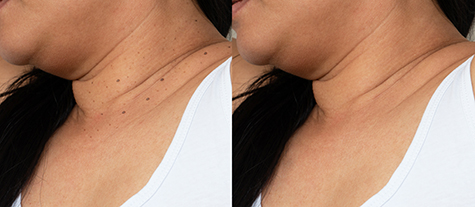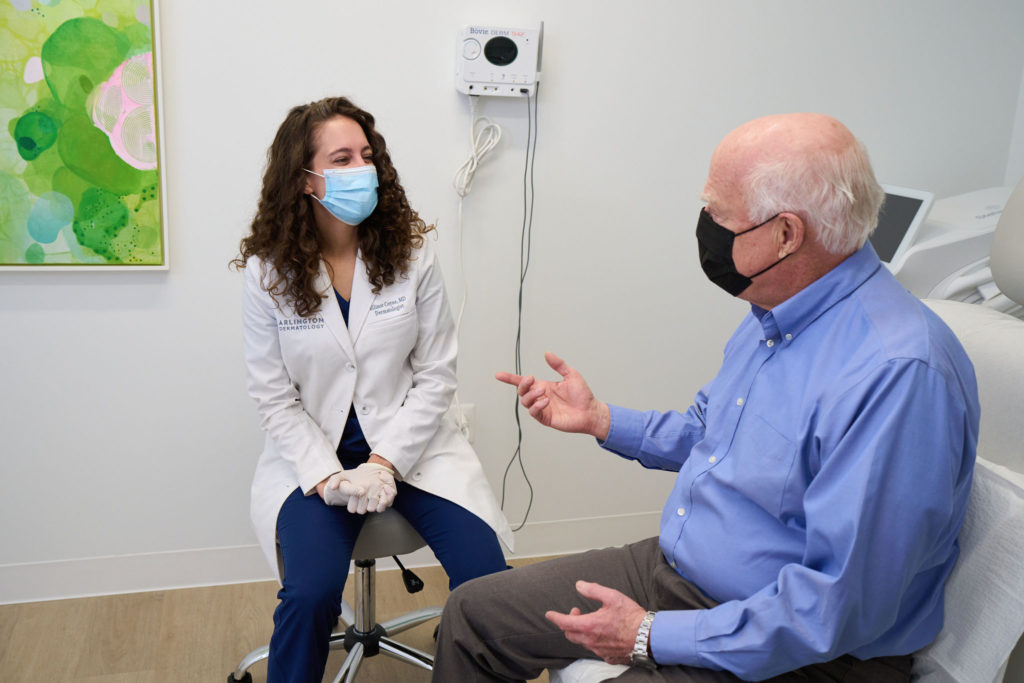How Does Skin Tag Removal Work?

Skin tags are small, benign growths of skin that commonly occur in areas of the body that move frequently or where friction is present. Although harmless, skin tags can be removed if you desire. To remove a skin tag, your dermatologist will typically use scissor excision, cryotherapy, or electrocautery.
How Do I Prepare for Skin Tag Removal?
Before your skin tag removal, your dermatologist may recommend a biopsy to ensure that the growth is benign. Prior to your appointment to have a skin tag removed, you should:
- Avoid shaving, waxing, or otherwise removing hair from the area
- Clean the area using antibacterial soap
What Should I Expect with Skin Tag Removal?
Your dermatologist may recommend scissor excision, cryotherapy, or electrocautery to remove your skin tag. Before any of these procedures, the area will be numbed using a topical or injectable anesthetic.
- Scissor excision involves carefully cutting away the skin tag using scissors
- Cryotherapy involves freezing the skin tag off using liquid nitrogen
- Electrocautery utilizes heat to remove the skin tag

What Should I Expect After Skin Tag Removal?
After skin tag removal, you should keep the area clean and follow wound care as directed by your dermatologist. If you feel soreness or discomfort, you may take over-the-counter pain medication such as ibuprofen or acetaminophen.
Skin Tag Removal FAQs
Is removal of skin tags covered by insurance?
Skin tags are considered to be benign lesions, so removal is often not covered by insurance.
What are skin tags caused by?
Skin tags can often develop when skin rubs together frequently. They are commonly found on the armpits, anus, thighs, eyelids, and the neck.
How long until skin tags fall off after freezing?
Cryotherapy involves freezing the skin tag off using liquid nitrogen. After treatment with cryotherapy, the lesions may scab over and then fall off within one to two weeks.
How much does it cost to remove skin tags?
After scheduling an appointment with your provider, they may recommend scissor excision, cryotherapy, or electrocautery to remove your skin tag. The provider will provide the appropriate pricing for your skin tag removal at the time of the visit.
When should I worry about a skin tag?
Only worry about a skin tag if you find them to be unsightly or irritating. If the skin tags are rubbing against the skin, clothing, or jewelry more frequently, then you can consider removal.
Should I be worried about skin tags?
Skin tags are completely harmless but can be removed if desired. There is no medical need to remove a skin tag.
What causes skin tags around eyes?
Although anyone can develop skin tags around the eyes, common risk factors are genetics, obesity, older age, and pregnancy.
Are skin tags hereditary?
The tendency to develop skin tags is typically genetic, but is also caused by several other factors.
Can skin tags fall off?
Skin tags may sometimes fall off on their own, or can be due to friction or unconsciously picked off.
Can skin tags be cancerous?
Skin tags are considered benign lesions and do not have the potential to develop into a skin cancer.
How do skin tags form?
Aside from being a genetic tendency, skin tags also develop as a result by constant friction between skin folds.
Why do skin tage itch?
Once formed, skin tags become itchy or irritated when they are rubbed or nicked by jewelry or clothing. They can also become irritated from shaving.
Schedule an Appointment
If you have a skin tag that bothers you for cosmetic reasons or causes irritation, schedule an appointment with a board-certified dermatologist at Arlington Dermatology.
To schedule an appointment at Arlington Dermatology, please call our office or contact us online.


